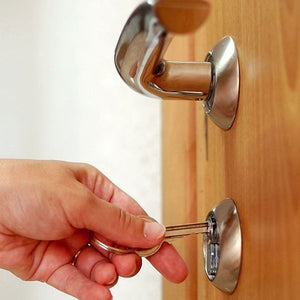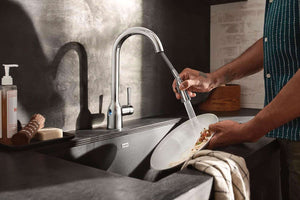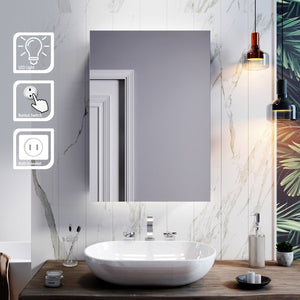
Are Door Locks Universal?
Have you ever stared at a sea of door locks at the hardware store, wondering if any would magically fit your door? The answer: it's not quite magic, but understanding different lock types is key. While there's no single "universal" lock, this comprehensive guide explores the fascinating world of door locks, equipping you to make informed choices for your home or business.
Learn more about The Basics of Door Locks - Click Here
What Are The Common Door Lock Mechanisms?
There are mainly two types of common Door Lock mechanisms, including;
Mortise Lock
Renowned for their strength and security, mortise locks are recessed into the door edge. They feature a separate lock body and a mortise cylinder that houses the key mechanism. Popular choices for commercial buildings and high-security applications due to their robust build and ability to accommodate multiple locking points within the door itself. These locks also generally tend to offer an easy, almost invisible aesthetic from the outside of the door.
Mortise locks are the maximum accepted type of door lock you're likely to look at. To deploy the mortise lock, a rectangular pocket, also called the mortise, has to be reduced into the door. The mortise lock typically has a spring latch on top. It is commonly connected to a take care of, so when you pull down on it, the latch retracts. When you release the handle, the latch springs lower back into the region.
Cylinder Locks
Also called cylindrical locks, those are the most commonplace kind for residential doors. The complete lock mechanism is contained inside a single cylinder that protrudes from the door's floor. They offer a great balance of affordability and security for everyday use, with a huge style and finishes to fit your house's décor. Installation is usually less difficult compared to mortise locks, making them a DIY-pleasant alternative for many owners.
What Are The Factors Affecting Lock Compatibility?
Now that we have explored the primary kinds, allow's delve into the aspects that decide if a lock will paintings with your door:
Backset
This refers to the distance between the edge of the door and the center of the knob or take care of. Common backsets are 2-three/8" and 2-half of", but ensure you measure your present door to discover the perfect suit. An incompatible backset can result in misaligned screws or holes that prevent proper installation or functionality.
Door Thickness
Locks are designed for particular door thicknesses, typically starting from 1-three/8" to 2-three/16". Choosing the right lock ensures proper functionality and a secure fit. If the lock is just too short for your door, it is able to no longer interact with the strike plate efficiently, compromising security. Conversely, a lock that's too lengthy would possibly protrude from the lower back of the door and prevent right installation of the interior hardware.
Door Handing
Left-passed or right-handed? This determines which side the handle and lockset are positioned on. Getting the correct handling ensures smooth operation and comfortable use. Imagine the disappointment of trying to use a doorknob that is supposed for the opposite hand!
Lock Function
Privacy locks, passage locks (non-locking), keyed entry locks – understanding your desired functionality narrows down compatible lock options. A privacy lock, for instance, is ideal for lavatories and bedrooms, while a keyed entry lock offers an additional layer of protection for exterior doorways or unique rooms inside your private home.
Special Considerations For Commercial Door Locks
Commercial settings often require a different level of security and functionality compared to residential doors. Here's a glimpse into the world of commercial locksets:
- Heavy-Duty Construction: Built to resist frequent use and ability compelled access tries, industrial locks are made from strong substances like metal. These locks may additionally include features like reinforced our bodies and hardened metal shackles to resist drilling or prying.
- Keypad or Keyless Entry: Many industrial buildings make use of keypads or keyless access structures to get entry to manipulate, offering enhanced security and convenience. Keypad entry permits legal personnel to enter using a code, while keyless entry structures can combine with get entry to playing cards, fobs, or even telephone apps.
- Fire-Rated Locks: For specific programs, hearth-rated locks are important to make sure doors stay stable in the course of a hearth occasion. These locks are designed to face up to excessive temperatures for a predetermined period, allowing for safe egress in case of a hearth.
- Panic Bar Exit Devices: In high-traffic regions or locations requiring quick egress, panic bar go out gadgets are important. These bars permit occupants to without difficulty push open the door from the inside in case of an emergency.
Let’s Find the Perfect Lock For You!
While a universal lock doesn't exist, understanding the different types, compatibility factors, and available features equips you to make informed choices. Consider factors like door type, security needs, desired functionality, and budget when selecting a lock. Don't hesitate to seek advice from an expert locksmith for assistance in measuring your door and recommending suitable lock alternatives. With the right knowledge, you could free up (pun intended!) a global of safety and convenience for your private home or commercial enterprise.
Buy Door Locks


